| Srl | Item |
| 1 |
ID:
181205
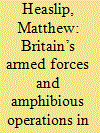

|
|
|
|
|
| Summary/Abstract |
Gallipoli left a lasting impression upon both the countries that participated and many that did not. It has been argued that the campaign negatively influenced Britain’s interwar amphibious preparations. Instead, this article will show that Britain’s armed forces were largely unaffected by such memories, and maintained their relative global standing in theory, equipment and training exercises for landing operations. The paper also highlights the role of amphibious warfare in fighting the many ‘little wars of Empire’ during the period.
|
|
|
|
|
|
|
|
|
|
|
|
|
|
|
|
| 2 |
ID:
181206
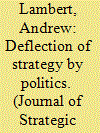

|
|
|
|
|
| Summary/Abstract |
For much of the past century discussions of British strategy between the 1880s and 1914 have been dominated by a tendency to focus on explaining what happened after August 1914, assuming the strategic thinking of British governments was in any way comparable to operational level focus of mass army operations directed at terrestrial borders and concluding that the Army had in some way ‘won’ the strategic debate, in 1911, or August 1914. This model derived considerable support from the post-war writings of Winston Churchill who, in the process of explaining his own controversial decisions, failed to reflect the reality of naval planning. The land focused, army-led model was contested between the wars, but once the British Army on the Rhine, on NATO’s ‘Central Front’, became the cornerstone of national policy it lent a curious validation to the idea that the military discussions of the pre-1914 Anglo-French Entente had represented a similar ‘commitment’. Furthermore NATO’s naval needs were restricted to the distinctly secondary ‘Flank’ or ‘Out of Area’ regions. These three important new books provide an opportunity to revisit the debate three decades after the end of the Cold War, when NATO has been operating as a global expeditionary force, rather than a conventional barrier shielding Western Europe.
|
|
|
|
|
|
|
|
|
|
|
|
|
|
|
|
| 3 |
ID:
181202
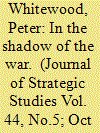

|
|
|
|
|
| Summary/Abstract |
This article examines Soviet perceptions of subversive and military threats from Poland to the Soviet Union in the 1920s and early 1930s. Drawing on archival materials from the Soviet foreign ministry, Communist Party leadership and security organs, it shows how the Soviet leadership held exaggerated fears about Polish threats to the Soviet western border regions and military intervention. A pattern of misperception stemmed from the Bolshevik defeat to Poland in the 1919–20 Soviet-Polish War, which rather than moderating the early Soviet regime ultimately encouraged more widespread use of state violence and provided further rationale for Stalin’s ‘Revolution from Above’.
|
|
|
|
|
|
|
|
|
|
|
|
|
|
|
|
| 4 |
ID:
181203
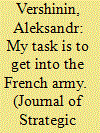

|
|
|
|
|
| Summary/Abstract |
This article is about the first attempts of Soviet-French rapprochement in the military sphere in the early 1930s. It is based largely upon unpublished documents from the Soviet foreign policy (AVPRF), military (RGVA) and the communist party (RGASPI) archives in Moscow. It contends that for the top leadership of the USSR the political rapprochement with France did not necessarily lead to making a fully-fledged military alliance. Despite the attitude of Soviet diplomats in Paris, Moscow remained distrustful of the French. It considered military cooperation with them as a way to reinforce the Red Army and strengthen international positions of the USSR without taking excessive obligations.
|
|
|
|
|
|
|
|
|
|
|
|
|
|
|
|
| 5 |
ID:
181201
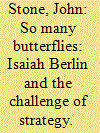

|
|
|
|
|
| Summary/Abstract |
Isaiah Berlin has not attracted much attention from academic strategists. This is unfortunate, because his concept of value pluralism helps explain why strategic decisions are burdened by uncertainty. It also highlights the importance of political judgement in reducing this uncertainty and the role of history in educating political judgement.
|
|
|
|
|
|
|
|
|
|
|
|
|
|
|
|
| 6 |
ID:
181204
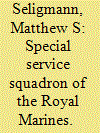

|
|
|
|
|
| Summary/Abstract |
It is usually maintained that before 1914 the Royal Navy had abandoned interest in amphibious warfare. This article argues otherwise. It shows that prior to 1914 the Admiralty sought to reconfigure the Royal Marines as an organic maritime strike force. The idea was advanced by junior officers and taken up by the naval leadership, who appointed a high-level committee to elaborate the details. Significant steps had been taken before war broke out, thereby showing that modern British amphibious warfare doctrine pre-dates the ill-fated Gallipoli operation and needs to be understood in a broader context than is currently the case.
|
|
|
|
|
|
|
|
|
|
|
|
|
|
|
|